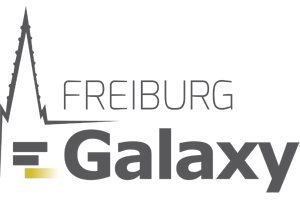
Galaxy Europe Launches New Open Source Server at Freiburg

Logo: Freiburg Galaxy
The new usegalaxy.eu server was officially brought into operation during a conference at the University of Freiburg. Galaxy, an open source platform enabling the analysis of big data for life sciences, is available for use by scientists via an Internet browser.
It does not require programming skills: all settings can be made using a graphical interface. Researchers throughout Europe have already made use of the service, which is coordinated in Freiburg. “To date we have registered about 900 users from 55 work groups, and within a year roughly a million requests have been calculated on our server,” reports Dr. Björn Grüning, who heads the Galaxy team at Freiburg. “We expect these figures to continue to grow.”
The possibilities of big data are fundamentally changing many research projects in the life sciences: manageablysized experiments are often replaced by analyses that represent hundreds of thousands of individual experiments. “Playing a part in cutting-edge research worldwide calls for statistical methods, high-quality data analysis and large computing capacity,” says Grüning.
The range of themes that users are working on with the aid of Galaxy is already huge: teams that are analyzing the epigenome of heart muscle cells, developing genome databases for insects, and studying the mechanisms of gene regulation within tumors introduced themselves at the conference.
After being initiated at Penn State University in the USA, Galaxy was further developed at the University of Freiburg in the Medical Epigenetics special research area and as part of the Deutsches Netzwerk für Bioinformatik-Infrastruktur (German Network for Bioinformatics Infrastructure, de.NBI).
The new Europe server is situated in the computer center of the University of Freiburg and continues to run as a community project. The project is the responsibility of the team at the University of Freiburg headed by Björn Grüning from the workgroup of Prof. Dr. Rolf Backofen at the Institute of Computer Science. The Freiburg Galaxy team also regularly holds training courses for users, administrators and developers. The material is free and accessible online.
Galaxy Project
https://usegalaxy.eu
Training Courses
https://usegalaxy.eu/freiburg/events
Training Material
https://training.galaxyproject.org
“Alles in einer Galaxy” article, in University magazine uni’leben 01/2017
www.pr2.uni-freiburg.de/publikationen/unileben/unileben-2017-1/#10
Contact:
Dr. Björn Grüning
Institute of Computer Science
University of Freiburg
Tel.: +49 761 203-54130
e-mail: gruening@informatik.uni-freiburg.de
https://www.pr.uni-freiburg.de/pm-en/press-releases-2018/green-light-for-galaxy-…












